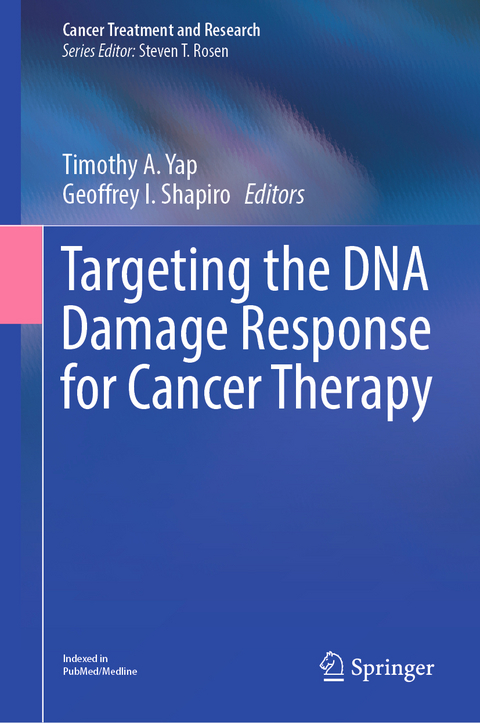
Targeting the DNA Damage Response for Cancer Therapy
Springer International Publishing (Verlag)
978-3-031-30064-6 (ISBN)
Targeting the DNA Damage Response for Cancer Therapy comprehensively reviews the application of PARP and other DDR inhibitors across oncology disciplines. Therefore, it is a valuable resource for all medical professionals and researchers who use or who are researching the use of these inhibitors on a day-to-day basis.
Dr. Timothy Yap is a Medical Oncologist and Physician-Scientist based at the University of Texas MD Anderson Cancer Center. He is an Associate Professor in the Department for Investigational Cancer Therapeutics (Phase I Program), and the Department of Thoracic/Head and Neck Medical Oncology. Dr. Yap is the Medical Director of the Institute for Applied Cancer Science, a drug discovery biopharmaceutical unit where drug discovery and clinical translation are seamlessly integrated. He is also the Associate Director of Translational Research in the Institute for Personalized Cancer Therapy, which is an integrated research and clinical trials program aimed at implementing personalized cancer therapy and improving patient outcomes. His main interests include the targeting of the DNA damage response (DDR) with novel therapeutics, such as PARP inhibitors, as well as the development of novel immunotherapeutics. Dr. Yap is and/or has been Principal Investigator for multiple clinical trials and translational studies evaluating novel monotherapy and combination strategies for targeting the DDR in cancer, such as PARP, ATR, WEE1, POLQ, CHK1, USP1, PARG, ATM, DNA-PK and PARP1-selective inhibitors.
Dr. Geoffrey Shapiro is Professor, Clinical Director of the Dana-Farber Center for DNA Damage and Repair, Leader of the Early Drug Development Center at Dana-Farber Cancer Institute and Co-Leader of the Developmental Therapeutics Program at the Dana-Farber Cancer Institute and Harvard Cancer Center. In his leadership roles, Dr. Shapiro has provided scientific and clinical direction for the design of early-phase clinical trials that evaluated a broad range of investigational agents including DNA damage response modulators that inhibit PARP and checkpoint kinases. He has also conducted studies of a variety of signal transduction and angiogenesis inhibitors. Furthermore, Dr. Shapiro has made proof-of-mechanism studies a mission of his program and has worked closely with basic and translational scientists at his institution and elsewhere to establish robust preclinical rationale for many trials. Dr. Shapiro's laboratory has made contributions toward the development of several combinations of targeted agents that are currently in clinical evaluation, such as PARP inhibitors for the treatment of solid tumors. He has also established translational assays to identify target engagement of these combinations in patients. More recently, Dr. Shapiro has sought to understand the effects of several classes of agents, notably PARP inhibitors, on the immune microenvironment, to further develop rational combinations.
Evolution of the development of PARP inhibitors.- Exploiting cancer synthetic lethality in cancer - Lessons learnt from PARP inhibitors.- Mechanisms of PARP inhibitor resistance.- Development of homologous recombination functional assays for targeting the DDR.- Clinical application of Poly(ADP Ribose) Polymerase (PARP) inhibitors in ovarian cancer.- Clinical use of PARP inhibitors in BRCA mutant and non-BRCA mutant breast cancer.- Development of PARP inhibitors in targeting castration-resistant prostate cancer.- Strategies for the management of patients with pancreatic cancer with PARP inhibitors.- Combining poly (ADP-ribose) polymerase (PARP) inhibitors with chemotherapeutic agents: Promise and challenges.- Rational combinations of PARP inhibitors with HRD-inducing molecularly targeted agents.- Combining PARP inhibition and immunotherapy in BRCA-associated cancers.- Mitotic MTH1 inhibitors in treatment of cancer.- Targeting ATR in cancer medicine.- Targeting polymerase Theta (POLq) for cancer therapy.- Targeting DNA-PK.- WRN is a promising synthetic lethal target for cancers with microsatellite instability (MSI).
| Erscheinungsdatum | 19.11.2023 |
|---|---|
| Reihe/Serie | Cancer Treatment and Research |
| Zusatzinfo | X, 328 p. 30 illus., 27 illus. in color. |
| Verlagsort | Cham |
| Sprache | englisch |
| Maße | 155 x 235 mm |
| Gewicht | 754 g |
| Themenwelt | Medizin / Pharmazie ► Medizinische Fachgebiete ► Onkologie |
| Medizin / Pharmazie ► Medizinische Fachgebiete ► Pharmakologie / Pharmakotherapie | |
| Medizinische Fachgebiete ► Radiologie / Bildgebende Verfahren ► Radiologie | |
| Schlagworte | BRCA mutant cancers • castration-resistant prostate cancer • DNA repair pathways • Homologous recombination • Inhibition • PARP trapping • Poly (ADP-ribose) polymerase • radiosensitization • Resistance mechanisms |
| ISBN-10 | 3-031-30064-5 / 3031300645 |
| ISBN-13 | 978-3-031-30064-6 / 9783031300646 |
| Zustand | Neuware |
| Informationen gemäß Produktsicherheitsverordnung (GPSR) | |
| Haben Sie eine Frage zum Produkt? |
aus dem Bereich


